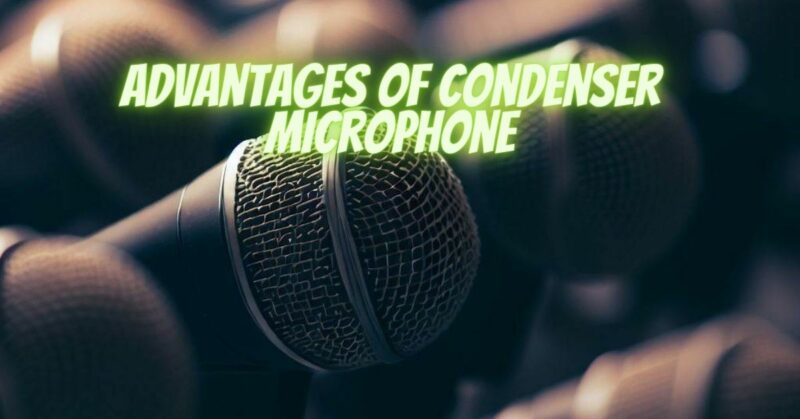Condenser microphones are revered for their exceptional audio quality and versatility in capturing a wide range of sound sources. Widely used in professional recording studios, broadcast environments, and live performances, condenser microphones offer numerous advantages that set them apart from other microphone types. In this article, we will delve into the advantages of condenser microphones, shedding light on their unique features and explaining why they are favored by audio professionals and enthusiasts alike.
- Sensitivity and Detail: One of the primary advantages of condenser microphones is their exceptional sensitivity. Thanks to their construction, which includes a thin diaphragm suspended close to a backplate, condenser microphones can capture subtle nuances and details in sound that may be missed by other microphone types. This high level of sensitivity allows for the accurate reproduction of vocals, acoustic instruments, and ambient sounds, resulting in recordings that are rich in sonic detail.
- Wide Frequency Response: Condenser microphones offer a wider frequency response compared to dynamic microphones. Their ability to capture both low and high frequencies with precision makes them well-suited for capturing the full range of musical instruments, vocals, and ambient sounds. This extended frequency response ensures that the recordings retain their natural tonal characteristics and provide a faithful representation of the source material.
- Transient Response: Condenser microphones excel in capturing fast transients, such as the attack of a drum or the plucking of a guitar string. Their lightweight diaphragm and low mass allow them to respond quickly to changes in sound pressure, accurately capturing the transient peaks and preserving the dynamics of the audio signal. This makes condenser microphones ideal for capturing the fast-paced and dynamic nature of musical performances.
- Extended High-Frequency Detail: Condenser microphones are known for their ability to capture high-frequency content with exceptional accuracy and detail. This makes them well-suited for capturing the shimmering harmonics of cymbals, the crispness of vocals, and the intricate nuances of string instruments. The extended high-frequency response of condenser microphones adds sparkle and clarity to recordings, enhancing the overall audio quality.
- Versatility: Condenser microphones are incredibly versatile and can handle a wide variety of sound sources. Whether you are recording vocals, acoustic instruments, podcasts, voiceovers, or field recordings, condenser microphones adapt to different applications with ease. Their ability to capture a broad range of sounds makes them an essential tool in recording studios, live performances, broadcast environments, and home recording setups.
- Phantom Power Compatibility: Most condenser microphones require phantom power to operate. This standardized feature allows the microphone to receive power from the audio interface, mixer, or preamp, eliminating the need for batteries or external power supplies. Phantom power ensures a reliable and consistent power source, enabling condenser microphones to operate at their optimal performance level.
Conclusion:
Condenser microphones offer a multitude of advantages that make them highly sought after in the audio recording world. Their sensitivity, wide frequency response, transient response, extended high-frequency detail, versatility, and compatibility with phantom power all contribute to their exceptional audio quality and versatility. Whether you are a recording engineer, musician, podcaster, or content creator, condenser microphones unlock new levels of sonic clarity and capture the nuances that bring your audio recordings to life. Embrace the advantages of condenser microphones and elevate your audio production to new heights of excellence.


